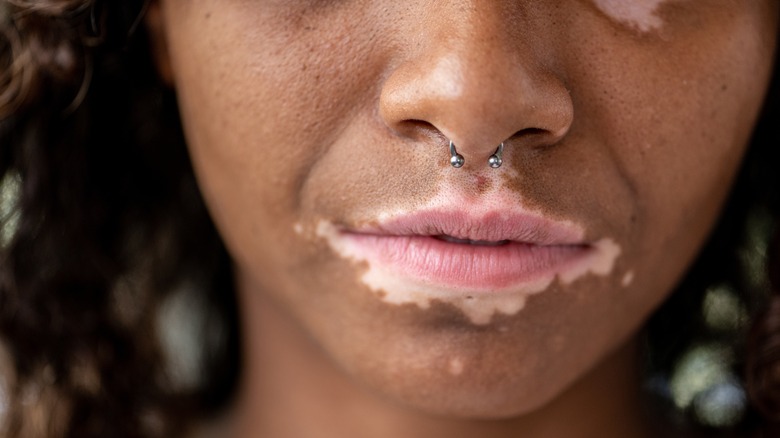What It Means When Your Lips Turn White
You're in the middle of brushing your teeth when you notice that your lips are looking a little on the pale side. This new symptom may be a cause for concern. White lips are a clear indication from your body that something is going on, and they can tell you more about your health than you think.
Lips are made of a special type of skin that's thinner than the rest of your body. Because of this, it's susceptible to dryness and chapping due to the weak barrier, according to the International Journal of Cosmetic Science. While the skin might be weaker, those thin layers can give you clues about your health because of the visible underlying network of vessels and blood. So, when you aren't getting enough oxygen, your lips might be blue. If something is going on with your red blood cells, your lips might be white.
Since the color of lips varies from person to person, the lightening of your lips can be as simple as eating more foods to energize your blood — or could indicate a more serious condition. So, it's best to know the different conditions and diseases that are causing your lips to turn white.
Anemia is a common cause of white lips
Experiencing pale lips can give you a good scare. However, one of the main causes of white lips, anemia, can be easily treated. Anemia is when you don't have enough oxygen-rich red blood cells in your body. About 2.8 million people experience it, according to the Centers for Disease Control and Prevention (CDC). In addition to pale lips, anemia can come with a host of other symptoms, like weakness, pale skin, dizziness, irregular heartbeat, concentration problems, and shortness of breath.
Anemia symptoms can wreak havoc on your life, so finding the cause is important. However, several different types of anemia could be to blame. A common one is iron-deficient anemia (that is, anemia due to low iron). Your body needs certain vitamins to help everything within your system run effectively. Red blood cell creation starts in the bone marrow and needs iron to function properly. But iron isn't the only culprit. You might also lack other nutrients, like B-12 or folate. You could also have a disease that affects the functioning of your cells or digestive tract, like sickle cell anemia. Both need to be diagnosed by a doctor.
Mild anemia is typically treated with vitamin supplements like iron or B12, depending on what's causing the problem. Severe anemia requires more intensive treatment, like blood transfusions and specialized medications, according to PennMedicine. While anemia might be one cause of pale lips, it's not the only one.
Additional conditions that cause white lips
Anemia might be the first place you want to look when you start sporting those bloodless lips, but it's by far from the only condition. Another common offender is oral thrush. Caused by a fungus, it causes patches on lips and mouth, along with soreness and loss of taste. It's common in children and toddlers due to their weaker immune systems. However, adults might find this irritating condition affecting them as well (via. Advanced Children's Dentistry). You might also want to check your blood sugar if your lips are looking a little peaky, since this can be a symptom of low blood sugar. Internal bleeding or a heavy menstrual period could also be to blame.
With anemia, oral thrush, and low blood sugar ruled out, then it's time to dive a little deeper into your medical sleuthing. It's not as common, but pale lips could be coming from vitiligo or a loss of melanin within the skin. Rather than just being white at once, you'll notice speckles of white that seem to spread. Serious diseases like cancer can also cause whitening of the lips, according to the American Cancer Society.
White lips might be as simple as adding more iron to your diet, or it could be something more serious like cancer. Because it can come from a host of different conditions, it's always best to see your healthcare provider to get a clear diagnosis.



